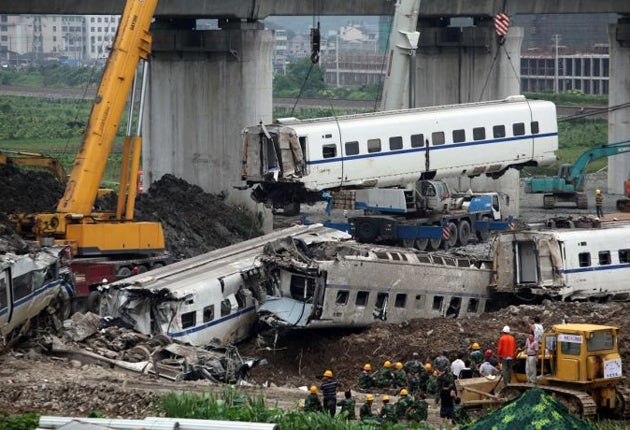Outrage at Wenzhou disaster pushes China to suspend bullet train project

Your support helps us to tell the story
From reproductive rights to climate change to Big Tech, The Independent is on the ground when the story is developing. Whether it's investigating the financials of Elon Musk's pro-Trump PAC or producing our latest documentary, 'The A Word', which shines a light on the American women fighting for reproductive rights, we know how important it is to parse out the facts from the messaging.
At such a critical moment in US history, we need reporters on the ground. Your donation allows us to keep sending journalists to speak to both sides of the story.
The Independent is trusted by Americans across the entire political spectrum. And unlike many other quality news outlets, we choose not to lock Americans out of our reporting and analysis with paywalls. We believe quality journalism should be available to everyone, paid for by those who can afford it.
Your support makes all the difference.China has put the brakes on its flagship high-speed rail project, freezing approval of new railway schemes and halting some bullet train manufacturing after a crash last month that killed 40 people and dented public confidence in the government.
Since the collision on 23 July, the Chinese government has been accused of putting the desire to modernise and innovate ahead of safety, with critics saying the system is too expensive and too dangerous.
The crash happened when one bullet train was stopped on a viaduct near the eastern city of Wenzhou after a lightning strike and another high-speed train ploughed into it. The accident has been blamed on faulty signalling equipment. "We will suspend for the time being the examination and approval of new railway construction projects," said the State Council, or cabinet.
The Railways Minister also promised a nationwide safety inspection and announced further reductions in the top speed of bullet trains following cuts in April. "This accident exposed the weaknesses lying in the railway transportation safety and management," admitted Sheng Guangzu in comments on the council's website. A state-owned manufacturer said it would suspend production of its high-speed trains used on the Beijing-Shanghai line while it investigates equipment failures. China North Locomotive and Rolling Stock gave no further details but the official Xinhua News Agency said trains "abnormally stopped" on three occasions due to faulty sensor signals.
The level of public outrage in reaction to the crash was intense. It was so powerful that even China's official media got in on the act. The normally placid People's Daily newspaper, which is effectively the Communist Party mouthpiece, wrote that China did not need "blood-soaked GDP".
The decision to put the project on ice came after an executive meeting of the State Council, which was presided over by Premier Wen Jiabao. The high-speed rail system is a prestige project for the Communist Party, designed to showcase China's innovative abilities and technological prowess, and Beijing insists the project is still a runner. "China will unswervingly continue its development of high-speed railways," the government said.
The project was one of the largest recipients of the trillions of yuan made available by the Chinese government for infrastructure projects after the economic crisis of 2008.
But the national rail system has been soaked in controversy. Before last month's crash, Mr Sheng's predecessor, Liu Zhijun, was sacked in February over corruption charges, after he allegedly took more than 800 million yuan (£77m) in kickbacks over several years on contracts linked to the high-speed network.
Mr Sheng told Xinhua that routes with a designed maximum speed of 350kph (220mph) will now run at 300kph. Beijing has also shelved plans to expand the high-speed network to 13,000km of railway by the end of this year. China launched its bullet trains in 2007. By the end of 2010, 8,358km of high-speed railways had been put into operation, ranking China first in the world in terms of length.
Premier Wen was forced to make a public statement that he was too sick to visit the accident site immediately after the accident – his absence had sparked widespread public anger. Known as "Grandpa Wen" for his comforting appearances at times of national stress, Mr Wen promised a full and frank investigation into the crash, but the damage had been done.
Join our commenting forum
Join thought-provoking conversations, follow other Independent readers and see their replies
0Comments